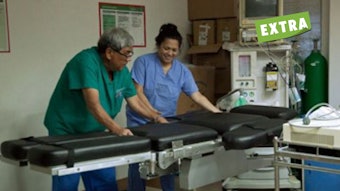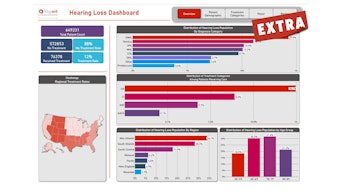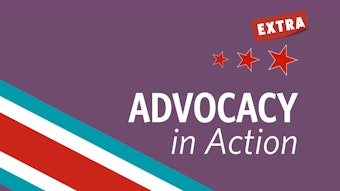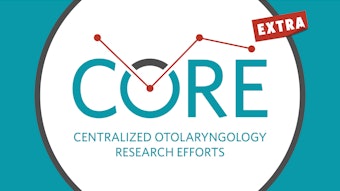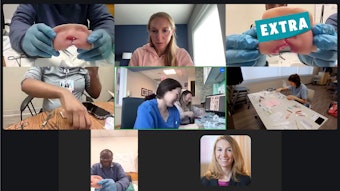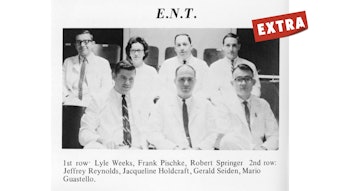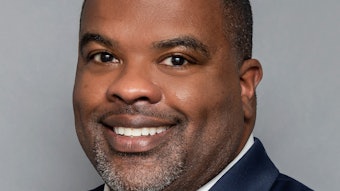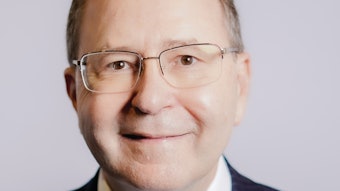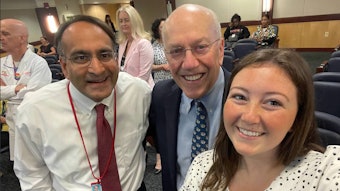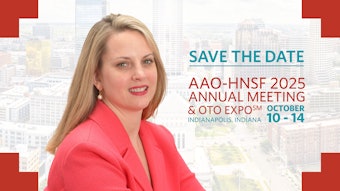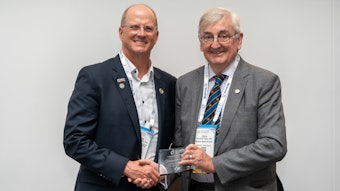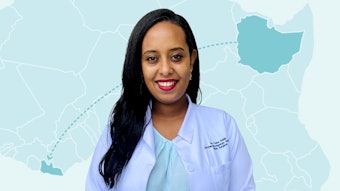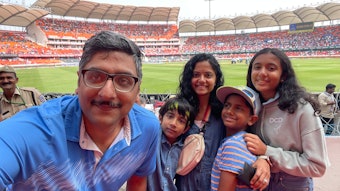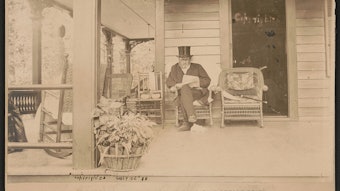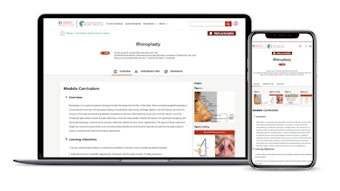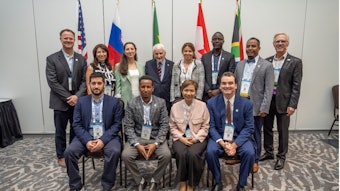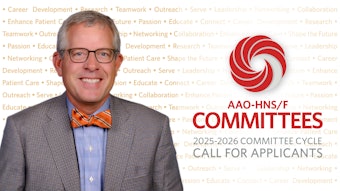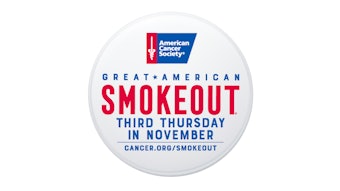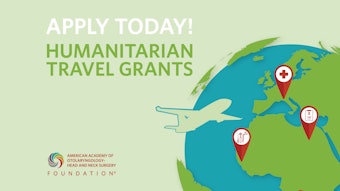The Legacy of a Leader: An Innovative Visionary in a Time of Transition
James C. Denneny III, MD, leaves a lasting legacy enhancing the trajectory of the AAO-HNS/F and the specialty one initiative, one member, and one patient, at a time.
Excerpts taken from an interview conducted in 2020 for Legacy of Excellence as well as Bulletin columns and articles published throughout Dr. Denneny’s tenure as EVP/CEO.
It has been a decade since James C. Denneny III, MD, assumed the role as the Executive Vice President and CEO (EVP/CEO) of the American Academy of Otolaryngology–Head and Neck Surgery and its Foundation (AAO-HNS/F). To the benefit of the organization and the specialty, leadership and engagement within the otolaryngology community has been something Dr. Denneny has gifted to the specialty through his 40+ year involvement with the Academy.
The Path to Becoming the EVP/CEO
 First headshot of James C. Denneny III, MD, as AAO-HNS/F Executive Vice President and CEO.
First headshot of James C. Denneny III, MD, as AAO-HNS/F Executive Vice President and CEO.
As he shares the story, it was a sequence of serendipitous events that led to the EVP/CEO position. During a trip with his son to Wyoming to see Old Faithful in Yellowstone National Park in 2012, Dr. Denneny received a call just as the geyser was erupting asking him to serve as Coordinator for Socioeconomic Affairs again. “I had essentially moved to Missouri where my farm is and was going to retire after I completed a teaching term at the University of Missouri, but the Search Committee called and asked if I would do the coordinator-ship another time, which would be my third time. I decided to accept the offer because I truly enjoy that area and was interested in helping to frame healthcare reform. I did so with the caveat that we develop young participants in the process who can carry on our expertise for the future,” he said in an interview for Legacy of Excellence.
A year later, an EVP/CEO Search Committee was formed when it became clear that David R. Nielsen, MD, was going to retire at the end of 2014 from that position.
“Initially I had not considered applying for the position, but in speaking to several colleagues and describing what I thought the future should look like, they encouraged me to apply.” That and other conversations Dr. Denneny had with the Co-chairs of the Search Committee led him to apply right before the deadline.
“As much as I liked caring for patients, I felt I could do more to shape the future of both the specialty and healthcare in general as EVP/CEO rather than seeing 100+ patients weekly. As part of the application, I submitted a 10-year plan for what the organization needed to do to meet the needs of the specialty and flourish no matter who was selected.” Specifically, this document outlined, from his perspective, the crucial tasks that the next EVP/CEO should focus on to provide members with the tools they would need five and ten years in the future to provide the best patient care.
His prior experience in the Academy and as both an academician and private practitioner prepared him to assume the role as the next EVP/CEO, coming to position both well informed and well engaged. Couple that with his innovative, visionary, and collaborative leadership style, he was able to hit the ground running to further the mission and goals of the AAO-HNS/F and, as he put it when asked what he hoped he’d accomplish, “enhance the trajectory of the specialty.”
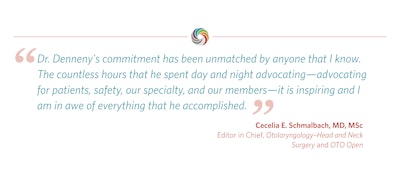
Enhancing the Trajectory of the Specialty
With sleeves rolled up and Strategic Plan in hand, Dr. Denneny stepped into the role at the end of 2014 taking a bird’s eye view of the specialty, the house of medicine, and the healthcare climate in the United States and around the globe. And being so closely connected to the strategic direction of the AAO-HNS/F for decades, he quickly acclimated to address the trends most impacting the membership and their patients.
“There was a lot—the members were under a lot of pressure in the number of ways that made practicing not as fun and not as rewarding. This worsening trend necessitated additional focus to address the root issues contributing to the situation…and acting on these causes in collaboration with other medical societies and other stakeholders, particularly the physician burnout issue was starting to rear its head,” he shared.
Specialty Unity Put Into Action
One of the most significant actions Dr. Denneny took as he entered this leadership role was getting all the subspecialty societies, The Triological Society, and the American Board of Otolaryngology (ABOto) together in a productive forum. “It is important that a small specialty such as otolaryngology work together whenever possible to maximize our effectiveness in advocacy, education, research, and member services,” he said in an interview in the February 2015 Bulletin.
This effort resulted in the creation of the Specialty Unity Summit (SUS), which held its first meeting during the AAO-HNS/F 2015 Leadership Forum & BOG Spring Meeting. In order to solidify his intent for the Academy to be the convener for otolaryngology, Dr. Denneny applied for membership to The Triological Society and submitted a thesis that was accepted and won the Maureen Hannley Award. In addition to further entrenching the Academy’s commitment to collaboration, he continued as an examiner for the ABOto and then the ABOHNS. He was also chosen as a Regent of the American College of Surgeons, which has also been helpful for collaboration within the house of surgery.
This investment in unity would be essential in the years to come as the house of otolaryngology addressed the annual onslaught of legislative and regulatory actions impacting practice and patient care. Collaboration within the specialty was a core element of every program and service provided by the AAO-HNS/F—from advocacy, health policy, and research and quality to education, publications, the Annual Meeting, and patient information.
This was no truer then when in 2020 the specialty needed to come together to provide the resources and tools to the global otolaryngology community in the face of the COVID-19 pandemic. Under Dr. Denneny’s lead, the AAO-HNS/F did not miss a beat in responding to the pandemic because the foundation of specialty unity already existed with a tried and true, productive, and effective model of cross collaboration. By 2021, the SUS was meeting twice a year via the virtual technology that became a rampant use of communication during the pandemic.
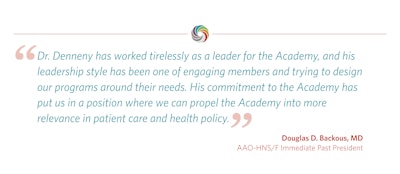
We Are One: Seeking Unity and Inclusion
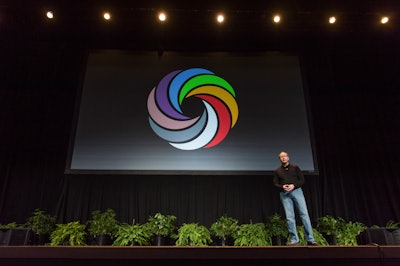
Another area of pride for Dr. Denneny—that was interconnected to the We Are One campaign—was the Academy’s focus on creating an inclusive community for otolaryngology practice and patient care by making a concerted effort to enhance diversity and inclusion in all programs and services. One of the most important areas that Dr. Denneny identified for that to happen was at the leadership level on the Boards of Directors.
Additionally, under Dr. Denneny’s leadership, the Academy actively sought and received grant funding in 2020 to develop a diversity video series that was released in 2021. The goal of this education resource, which was a collaborative effort with the Diversity and Inclusion Committee, was not only to raise awareness, but effect behavior changes in the healthcare community as they related to social determinants of health and implicit bias.
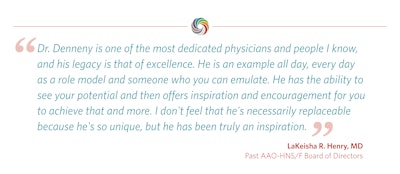
Otolaryngology-Specific Clinical Data Registry: Planning for the Future
Specialty unity was also an integral component of the new undertaking of the clinical data registry. In his role as Socioeconomic Coordinator, Dr. Denneny had previously been involved and thus was intently familiar with the course of direction the AAO-HNSF was taking with the development of a quality portfolio of clinical practice guidelines and performance measures specific to otolaryngology. The creation of a Clinical Data Registry (CDR) was a part of the plan he presented to the EVP/CEO Search Committee, and, at his first BODs meeting in 2015, an in-depth study was approved. He also knew the importance of including all specialty areas in the development of the registry if it was to fully represent otolaryngology-head and neck surgery.
Through his previous involvement and incredible work by staff, the progression of the registry did not miss a step after the BOD approval to move from concept to implementation in early 2015. “Our members have asked us to provide the tools that they need to survive and thrive as healthcare delivery transitions away from the fee-for-service model to quality-based care delivery. We listened and feel that Reg-entSM will provide these tools for our members in a ‘one-stop shopping’ arrangement,” he said in the October 2015 Bulletin.
As Dr. Denneny saw it, the registry was addressing, among other things, ongoing reporting requirements impacting the practice of medicine, the continued pressure and ongoing devaluation of surgical services as well as the initiation of a quality program that was not well defined. “Value is the catch word, that is based on cost and quality. One of the things that I was looking forward to in becoming EVP/CEO was expanding an already existing quality program into where it could help provide the valuation data through the registry. This will put our members in excellent position going forward.”
In its first six years of implementation and operation, Reg-ent supported members in quality reporting and actively advocated for members on issues related to quality data reporting, data access, and interoperability. In 2021 it moved into Phase II of operations that expanded its functionality to include research, clinical trials, and outcomes. In 2024, Reg-ent underwent a transition of platforms to implement the cutting-edge technical experience and tools needed for the collection of the necessary data sets. This will enable Reg-ent to identify and define “best care” for the conditions that otolaryngologist-head and neck surgeons treat through an easier and more reliable process of data extraction.
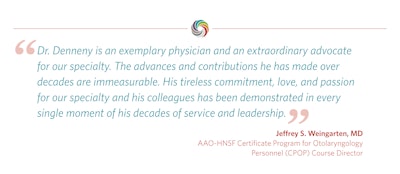
Healthcare Delivery in an Era of Challenges
Dr. Denneny noted that most of the critical areas in the evolution of the current healthcare system existed on a continuum but recently have been driven by principles such as quality and value that crossed into both the governmental and private arenas. One area of challenge he noted was, “The continued assault by private payers to not pay for essential procedures that have been done for a long time. It's very frustrating to the members and for us trying to help them with that.” But this was an ongoing priority throughout his work with the Academy. Tools, resources, and advocacy initiatives have been put in place to support members in fair and equitable payment, with room to grow and be flexible as the healthcare environment changes.
Payment was just one component and stressor to members that Dr. Denneny wanted to tackle head one. Each attempted healthcare reform plan introduced over the years always resulted in the physician getting less and doing more. The cost to maintain a practice has been continually on the rise. “One of my goals continues to be to make recommendations on how to reform the overall health system in a way that assures our members are able to practice high quality medicine in whatever setting they want, whether it’s academic, employed, or private practice, and to make sure there’s still a market for private practice.”
In the December 2016/January 2017 Bulletin, Dr. Denneny shared, “An equally critical area for discussion and planning, is looking at what will the practice of otolaryngology be in the future. This deserves attention as we progress through the pathway of reform.” He noted that many factors would interact to define the otolaryngology practice of the future and significantly alter practice and patient care. These included the supply of otolaryngologists, scientific advances, scope-of-practice adjustments, changes in medical education, utilization of allied health providers, population health management, clinical data defining best patient care, and overall payment reform.
In response, the Future of Otolaryngology Task Force was created to, “Continue to work with our specialty societies, the house of surgery, the house of medicine, and, most importantly, our members to proactively prepare for and adapt to future directions in healthcare and the practice of otolaryngology.” This Task Force’s scope expanded even further during the pandemic when, through collaboration with all the specialty societies, produced materials and information for otolaryngologist-head and neck surgeons to consider when returning to practice during the COVID-19 pandemic.
Another trend playing into the future of otolaryngology practice was the increase in administrative burdens for physicians such as precertification and documentation for insurance companies and the difficulty and required to use electronic health records, “It lessened the time they had with their own patients. More administrative work, more details, more expense to practice, less control, and then we started looking at the corporatization of medicine. Practicing was very much more difficult, both academic centers and private practices particularly. So that was something that that was high on my list to look at and address some of the problems.” Dr. Denneny addressed these as he did with his other approaches – though collaboration with coalitions and others within the house of medicine. Additionally, the added stress of these administrative burdens also led to the Wellness Task Force to provide resources and an outlet for members to find balance among all the reporting requirements and payment reforms in the midst of their practice and patient care.
To provide further analysis of the otolaryngology workforce, Dr. Denneny elevated the work of the Workforce and Socioeconomic Survey Task Force for the publication of the 2022 Otolaryngology Workforce survey report and the 2023 Otolaryngology Workforce Survey report. These reports contained the most in-depth look at the otolaryngology workforce since the 1975 National Institutes of Health (NIH)-sponsored study. The reports are essential to inform discussion in the critical areas of the future evolution of otolaryngology training, team-based care strategies, practice design, and advocacy.
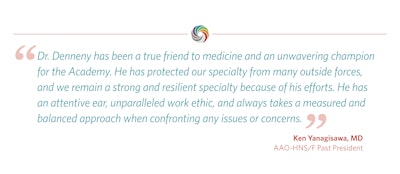
The Future of Private Practice and the OTO Forum
In the summer of 2021, the Private Practice Study Group (PPSG) was conceived by leadership with the goal to provide a home for the disillusioned private practice community within the AAO-HNS. The hope was for the PPSG to serve the unique needs of the private practitioners who represent a majority of AAO-HNS membership and to foster future and enthusiastic private practice leaders in the Academy. The PPSG grew quickly and became a reliable home within the Academy for private practitioners. On September 30, 2023, the BOD approved the PPSG petition to become the newest Section of the Academy, the Otolaryngology Private Practice Section (OPPS). Dr. Denneny’s support of the goals of this group was essential to its success and impact on members, their practices, and their patients.
As part of the effort to meet the growing needs of the private practice community within the Academy membership, Dr. Denneny worked with OPPS leadership and the OTO FORUM was born. The inaugural meeting was held in April 2024 and thematically focused on all things private practice with the guideposts of networking, benchmarking, innovation, and healthcare trends. It offered leadership discussions and practice management tools as well as highlights of the current and future needs of private practice physicians caring for otolaryngologic patients. The 2024 event was a resounding success and exemplified the Academy’s commitment to empowering private practitioners and equipping them with the tools and insights they need to thrive in an ever-evolving healthcare landscape. Planning of the second OTO Forum is already underway and will be held in April 2025.
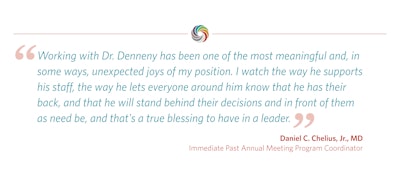
The Future of Education Is Now
Under Dr. Denneny’s leadership, the AAO-HNS/F stayed on the cutting-edge of technology and innovation in a variety of areas. This was essential to remain relevant to members and provide them with access to the programs and services needed to sustain and thrive in practice and quality patient care.
These endeavors led to the work of the Future of Education Task Force in charting the course for the future of the AAO-HNSF Education program. “As technologies advanced, we've advanced our education. And we want to keep current with the new ways of doing education…And so we've tried to keep our education, including the Annual Meetings, fresh and updated. And I think most of the changes we've made have been valuable in that way.” This included the courage to sunset a long-standing education product after more than three decades, the Home Study Course. In its place in 2020, the AAO-HNSF launched FLEX, the new flagship education product developed with the involvement of more than 130 Foundation education faculty.
Another area of need in resident education arose within Dr. Denneny’s tenure. This resulted in, once again, working across the specialty for the collaborative development and rollout of the Otolaryngology Core Curriculum (OCC) on July 1, 2024. This occurred as a result of the coordinated efforts of the Otolaryngology Program Directors Organization (OPDO) Editorial Board and the AAO-HNSF team of volunteers on the Education Committees. The program has employed the latest, state-of-the-art technology with the most comprehensive curriculum to ensure that residents have a strong foundation of core knowledge required for otolaryngology-head and neck surgery practice.
Other advancements in technology also include Dr. Denneny’s understanding of the need for investment in the infrastructure for the operations of the Academy. This proved invaluable when the AAO-HNS/F was able to seamlessly transition to a 100% telework situation when the global pandemic impacted workspaces around the world. Not only was staff able to continue to provide programs and services to members, but the BODs and all other volunteer committees, workgroups, and task forces were able to continue to meet and move forward with the progress of their scopes of work.
Another impact of the pandemic that also called for an innovative approach was the AAO-HNSF 2020 Annual Meeting & OTO Experience. Rather than cancel this yearly tradition, the AAO-HNSF launched into the planning for a 100% virtual Annual Meeting, the first-ever for the organization. And in 2021 when the world was just starting to realize a post-pandemic world with some normalcy, the AAO-HNSF produced a hybrid meeting, which allowed the option to attend in-person or via a virtual platform.
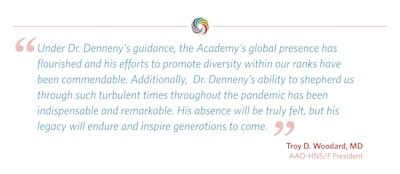
Taking the Lead With Innovation to Connect the Global Otolaryngology Community
Dr. Denneny was instrumental in the “Bringing Together the World of Otolaryngology Community,” which was the theme of the 2020 Annual Meeting. The International Program grew in strides, from the remodeling of the International Program at the Annual Meeting to increasing the number of International Corresponding Societies and Joint Meetings, when travel allowed, to the implementation of the ever-popular Global Grand Rounds series and the creation of the Eugene N. Myers, MD Global Education Fund to benefit the continuing education needs of otolaryngologists practicing in low-income/low-resource countries. This was an important area of focus as he noted, “We're learning from everyone around the world as they are learning from us.”
Expanding the global program has been a primary focus from the beginning for the Academy’s leadership. The concerted effort of many have resulted in unprecedented growth over the past decade.
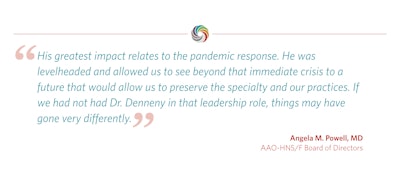
Honoring our Rich History
Through multiple avenues during his tenure, Dr. Denneny demonstrated his respect for the history of the organization and the specialty. In 2016, he led the development of the renovated Otolaryngology-Head and Neck Surgery History exhibit at the Academy’s headquarters with a ribbon-cutting ceremony held during the AAO-HNS/F 2016 Leadership Forum & BOG Spring Meeting. As the Women in Otolaryngology (WIO) Section celebrated the 10th anniversary of the founding of their endowment fund with their “Four Days in Boston” movie, the Academy surprised the WIO with the “History of Women in Otolaryngology” production and exhibit in the museum.
In 2019, he initiated a project to update Century of Excellence, which was published in 1996 to commemorate the 100th anniversary of the AAO-HNS/F and its predecessor organizations. This comprehensive tome details the growth of the specialty and the people who positively influenced its course. With the AAO-HNS/F 125th Anniversary on the horizon in 2021, Dr. Denneny sought to keep the history alive by providing the next installment of the AAO-HNS/F history to the members with Legacy of Excellence.
Dr. Denneny wanted to further the special recognition of this milestone marker in a number of ways. He received Board approval for a special edition of the Bulletin, a gift to members to commemorate 125 years.
“Celebrating such a momentous milestone as we are with our 125th anniversary, causes one to pause and reflect on the path we have taken. It has reminded me of the long lineage of people who have contributed over the years to build and shape the specialty and our organization to what they are today. Dedicated and forward-thinking leaders have helped set the course for otolaryngology to expand and thrive through innovation and research, consistent education programming, and a continued focus on quality patient care. It has been amazing what our small specialty has been able to accomplish in the house of medicine and in patient care,” remarks from Dr. Denneny in the June 2021 Bulletin.
 Dr. Denneny (right) receiving the Hall of Distinction Award during his induction with the class of 2022 at the AAO-HNSF 2022 Annual Meeting & OTO Experience.
Dr. Denneny (right) receiving the Hall of Distinction Award during his induction with the class of 2022 at the AAO-HNSF 2022 Annual Meeting & OTO Experience.
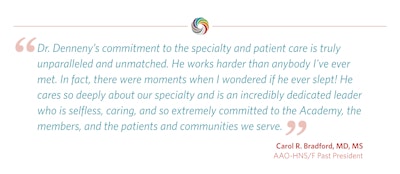
Educating the Patient
Dr. Denneny’s lifelong commitment has been to patient care. To him, supporting the specialty is supporting patient care and vice versa. The two are tied together as one concept. This was clearly demonstrated throughout his years of both academic and private practice. His goal of “trying to leave a system that will take care of my kids and their kids and the population,” intertwined with his work in the Academy through his volunteer leadership positions and as EVP/CEO.
ENThealth.org, which launched in October 2018, was an important initiative to get patients the information they need about their health. And just as he had done with Reg-ent, Dr. Denneny wanted to ensure specialty-wide participation in the development of content for the website. Under his guidance, a structure was created to include a wide spectrum of experts offering content that covers the conditions, diseases, and disorders within otolaryngology-head and neck surgery.
Another important patient education initiative that was launched under the leadership and direction of Dr. Denneny was World Sinus Health Awareness Day, which became World Sinus Health Awareness Month in 2024. This program is an upgraded version of Sinus Pain Awareness Day, the observance he brought forward as the Chair of the Sinus and Allergy Health Partnership and promotes patient education through expansive media outlets including social media in a global effort.
With Appreciation…
Dr. Denneny was drawn into the specialty from his own experiences as a patient when he had his tonsils removed and was tested and treated for allergies as a child. This, along with friends at church and in other areas of his life who were physicians and otolaryngologists, particularly Willard B. Moran, MD, drew him to pursue the path into otolaryngology. But who drew him into his involvement with the Academy?
That honor goes to M. Eugene Tardy, MD, who Dr. Denneny noted got him engaged in Academy activities and most influenced his leadership style, “In addition to being a premier facial plastic surgeon, Dr. Tardy was also a unifying leader in the specialty.” There were others as well, “I had the honor and privilege to come under the tutelage of some of the greats at otolaryngology who helped steer me and my career intersection with the Academy.”
In addition to acknowledging the legacy of those who came before him to help shape his career and experiences, Dr. Denneny has consistently shared his appreciation for the hundreds of volunteer members who contributed their time, energy, resources, knowledge, and expertise to the Academy and the specialty.
“The thing that's amazing, given how little time practitioners have, is how much so many of our members donate to the cause. We could never do the work we get done without them. And as an aside, the amount of work the staff—probably the lowest number of staff we've had in couple of decades—puts out is significant. So that's what makes it all possible.” This was a sentiment that was relayed consistently throughout Dr. Denneny’s tenure demonstrating his point that collectively the Academy can accomplish more.
His approach explains why his favorite part of the job is meeting members. “When I hear what the young residents and fellows are interested in and see the enthusiasm and general intelligence that they have, I know that all bodes well for the future of the specialty. I also like interacting with our members to hear more about what they need and learn about what is going on in their day-to-day practice. It's very encouraging to see all the advances that are going on in our specialty and having that interaction with the members has helped me to better represent them as their EVP/CEO.”
The Academy’s True North
Dr. Denneny’s initial goals involved ensuring financial stability. Under his leadership, reserves have doubled, and membership continues to grow. On the strategy he employed to serve Academy members, Dr. Denneny shared, “One of the things we've tried to do is listen to what the members need. We don't want to be doing something they don't want. And listening to what's going on helps us help them.”
Still to Come and Back to the Farm
The full legacy that Dr. Denneny leaves from his service in this position as EVP and CEO is still to be written and realized as the organization and specialty continue to benefit from the innovative initiatives that were implemented under his leadership. His initial goal to “enhance the trajectory of the specialty” has been and will continue to be amplified by the evolving story of his legacy.
The plans for retirement to his farm back in 2012 are now coming to fruition. And although delayed more than a decade, the global otolaryngology-head and neck surgery specialty is thankful for those postponed plans, his continued leadership, and a commitment to a specialty for which he has demonstrated such love, passion, respect, and commitment.
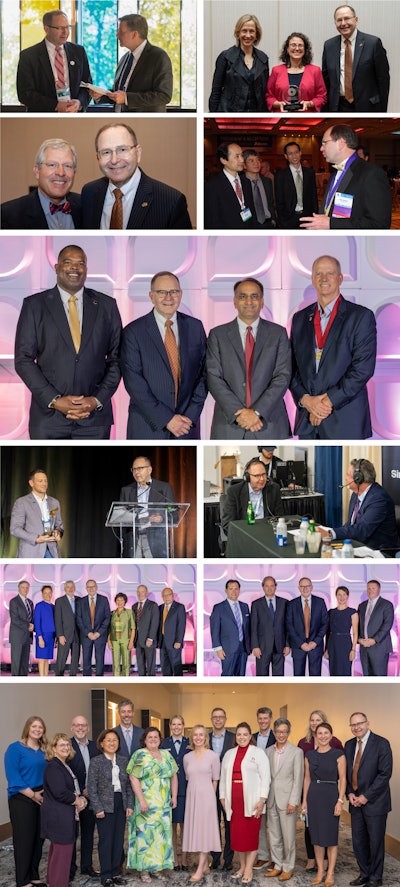
References
Legacy of Excellence
February 2015 Bulletin
October 2015 Bulletin
December 2016/January 2017 Bulletin
